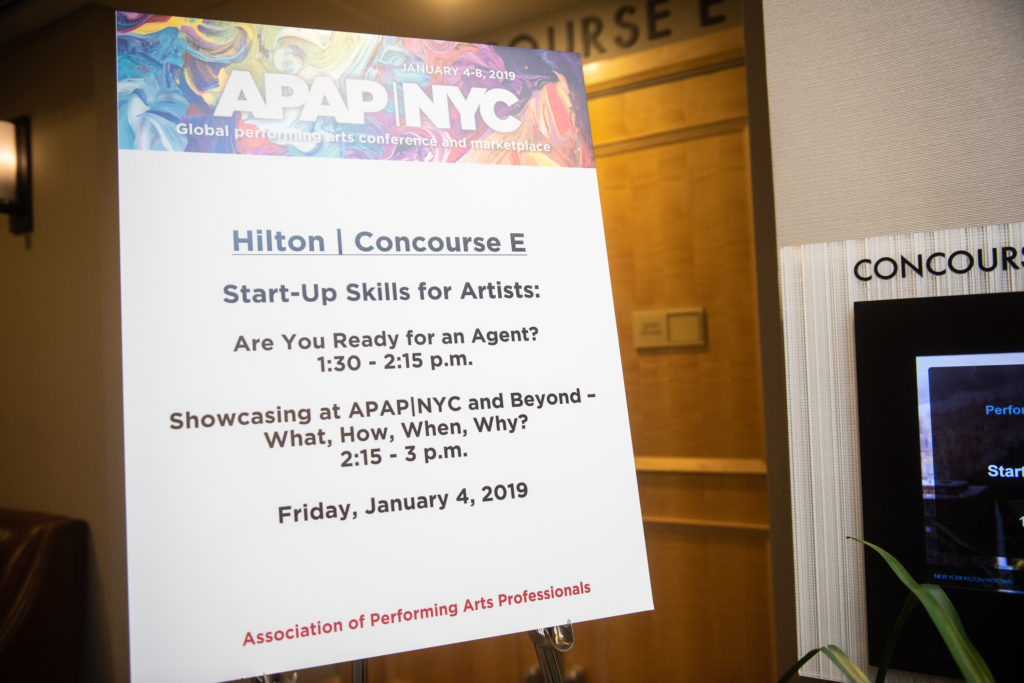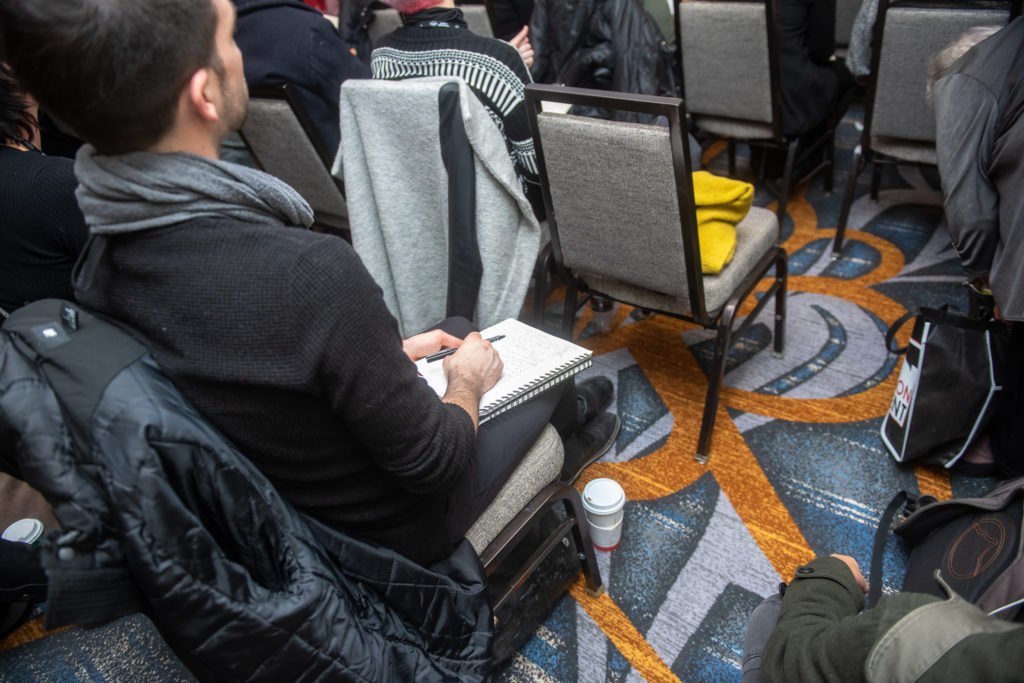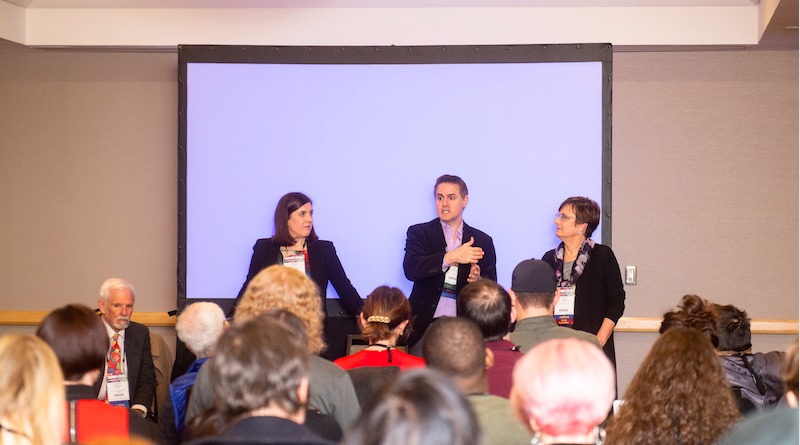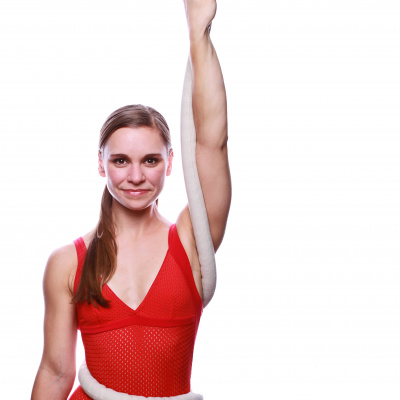Steal From an Artist with an Agent: Advice from APAP Pros on Artist Representation
The Association of Performing Arts Professionals conference, affectionately known as APAP, annually floods the midtown Hilton for a weekend in January. Anyone who has participated in the conference knows it’s an exhausting tornado of chit chat, business cards and handshakes. Privately, fingers are crossed on all sides. Artists hope that the expensive endeavor of purchasing time and space will result in a season of bookings that allows them to do what they do best: perform. Agents work tirelessly to promote the artists on their roster, and presenters hope they find just the right shows to pack houses and please audiences. Despite the corporate hustle, it’s all done in the name of the beautiful human to human exchange of live art.

A nice perk of the pre-conference days are free panel discussions and informational sessions. I attended a panel titled Are you Ready for an Agent? You would expect the answer to this titular question to be based on experience. Once you’ve accomplished x, you’re ready for an agent. Yet, actual experience in the field was never spoken about. The words resume, CV or anything akin to “paying your dues” were never mentioned. The conversation solely focused on marketability rather than personal know how. I listened with a circus artist’s ear for any hints or advice that might be directly applicable for those of us with specialty skills and often rigging or unusual technical needs.
Manuel Prestamo of Performance Management International, a veteran in the industry, moderated the conversation. Sharing wisdom from her twenty years of experience as a presenter turned agent was Laurel Canan of Siegle Arts Management. Ron DeStefano and Melissa Giattino from EPIC Arts Management chimed in with thoughts from their experiences as performers turned agents.
The conversation opened with, when is the best time to approach an agent? The panel quipped, “Not at APAP!” It was made very clear that to usurp an agent’s precious time during a conference and break the unspoken code that promoter/presenter conversations trump all was extremely taboo. Instead, they said, email agents your electronic press kit at the end of February. (Reason being, March, April and May is when agents prep for the next conference season which starts in August.)
Prestamo asked of the panelists, “What is the thing that triggers you to say, I really love this person’s work, and I would be proud to speak on their behalf and stake my reputation on their product and behavior?” It all boiled down to excellent digital materials.
1.
What: Great video
Why: DeStefano shared that a presenter earlier that same day had flat out said, “If the video isn’t good, don’t bother. The quality of the artist doesn’t matter if you don’t have the best two to three minute video on planet Earth.” He continued in his own words, “There are people less talented than you that are selling shows because they have great videos.” Video is your first impression, and you can only make it once.
How: The panelists said some artist spend ten to twenty-thousand dollars on a video shoot. (You could feel stomachs tighten in the room.) To ease that thought, they also offered the idea to barter. Offer to perform for free at a venue you have a relationship with if you can bring in a video crew. Another thought was to seek out a college or university that might have video, editing equipment and personnel willing to work for a cheaper rate.
2.
What: A website
Why: DeStefano was clear, “They will hunt you down.” If your video has perked a presenter’s ears, they will immediately look you up. It’s important to have a curated space for them to continue to get to virtually know you.
How: Like getting good video, hiring an experienced designer is an expensive but worthwhile investment. Platforms like Squarespace and Wix have made self-designing easy and more affordable.
Extras!: Prestamo advised to curate your online presence with a very clear directive, “Remove all the bad stuff!” Laurel added that the presenter needs to be able to envision your act or show in their theater, and if your Youtube channel is cluttered with small cabaret performances they will have a hard time imagining you on their stage.
3.
What: Tech rider and stage plot
Why: This answer is two fold. Agents can’t sell you accurately if they don’t know how your show functions and what your needs are. Secondly, it’s a sign of intelligent professionalism to be able to accurately communicate what it takes to put your show up. Once a venue receives your tech rider, they will often work from this original document for your production, so accuracy and thoroughness is key. As soon as a venue is interested in you, they will ask for your tech rider. The panelists agreed that this element was more like #2.5.
How: There are free stage plot creators online, and the panelists recommended having riders ready for all the aspects and varieties of your show (i.e. what does the band need, what does the the three actor version versus the six actor version need). Make sure it’s “concisely laid out in a beautiful form,” said DeStefano.

An aside about great photos: DeStefano mentioned, “It’s better to have two amazing photos than six mediocre ones.” Prestamo suggests, “Go to presenters websites, grab [the photos you want to emulate], take them to your photographer and say, I need stuff that makes me look like this.” It reminded me of the a small, delightful book Steal Like an Artist by Austin Kleon. This portion of the panel expanded that title in my mind to Steal From an Artist with an Agent. It’s not an actual suggestion, but rather a reminder that you’re not starting from scratch or reinventing the wheel. Go find what’s working for other people and make sure your unique look and work are at the same caliber as their unique look and work. Prestamo said presenters are looking for “action, interesting, unique, captivating” photos. He also said, “I have booked artists on, ‘God, look at that photograph!'”
So far, the panel had taught me that video, website tech specs and photos are the golden tickets to getting an agent and landing bookings. I started to wonder, where does real life performance experience lie in all of this?
How can we salvage some humanity in the marketing process while still making excellent use of the instantaneous and truly awesome technology available to us?
I suppose the conversation was accurately reflective of the social media drenched world we live in. Performers do get booked based on their Instagram feeds and number of followers. I’ve always been a little stunned at this. What in an Instagram photo tells you about a performer’s etiquette in the room, personal know-how of the ins and outs of the industry or professionalism while collaborating? If these qualities aren’t valued in how presenters are booking performers and shows, what happens to the quality of artistry? I don’t mean talent. I mean the ritual of passing on a way of life, a humbleness and respect for your craft through mentorship. I know I digress, but the panel discussion left me feeling like the precious intimacy between artists and audience during live events is being ignored. Rather than being honored and preserved, this human to human connection is being supplanted by the digitalization of how performing artists are expected to market themselves.
If the goal of finding an agent is to have a steady career of sharing that magical exchange that can only happen in the flesh, how can there be a compromise between the digital and the live? How can we salvage some humanity in the marketing process while still making excellent use of the instantaneous and truly awesome technology available to us?
Back to business…
4.
What: Your bottom line
Why: Your agent needs to know what is the absolutely lowest cost at which your show can function. They will try to sell you for more, but this has to be established for clear communication with bookers.
How: Do the math: flights to location, personnel, all performer fees, per diem, how much is a rental car for your act, lodging, etc. Everything that costs anything needs to be wrapped up into a package deal.
If I were to retitle this panel based on what I learned, it might read, How to Shape Your Digital Identity to Catch an Agent’s Eye. The matchmaking can’t start until all the virtual pieces are in place. Once that hurdle has been crossed, there has be chemistry, trust, and a compatibility of style. Prestamo compared it to a good marriage.
Self-representation, while admitted to be a valid option, was strongly frowned upon in the conversation. Prestamo described how most bookers avoid the APAP aisle where self-represented artists have booths. He translated their thoughts for us, “If they were any good, they’d be represented by somebody.” I became curious if there was a panel at APAP about how to negotiate self-representation to rebute this harsh statement.
In the few minutes left for questions, I told the panelists I was there as a member of the circus community and asked if they, as agents, had any advice for performers with specialty skills. I felt my question was misunderstood. The answer was an explanation of the fact that yes, circus artists and companies participate in conferences and have representation. DeStefano said, “There are agents who have that as a small component on their roster and those who specialize in circus. Most agents just want good stuff. There is a place for you here, for sure.”
So I pushed my way forward through the crowd as the room turned over to the next session. I caught Laurel Canan and asked again, is there something specific that circus artists can do to facilitate the tricky landscape of finding and getting the right agent. She reiterated that great materials are key. And then I heard the gem I’d been waiting for: “A clear explanation [a short, written description] of what the show is” is imperative. You have to be able to accurately talk and write about your art.”
We got swept away by the incoming audience, but this final thought connected everything for me. If you’re going to enter this wild world of agents and conferences, you have to know yourself well enough to have an authentic relationship with your work. Only then can you clearly communicate yourself and your art to prospective agents and presenters through your videos, photos and writing. If your digital representations truly represents the authentic you, it might be worth the money, time and effort. And in turn, a good relationship with your agent means success for you both.
All photos provided courtesy of APAP. Main photo by Christy Kissick for APAP....
Do you have a story to share? Submit your news story, article or press release.





